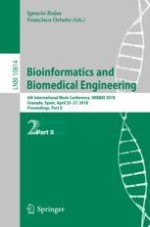2018 | OriginalPaper | Buchkapitel
Sampling Defective Pathways in Phenotype Prediction Problems via the Holdout Sampler
verfasst von : Juan Luis Fernández-Martínez, Ana Cernea, Enrique J. deAndrés-Galiana, Francisco Javier Fernández-Ovies, Zulima Fernández-Muñiz, Oscar Alvarez-Machancoses, Leorey Saligan, Stephen T. Sonis
Erschienen in: Bioinformatics and Biomedical Engineering
Aktivieren Sie unsere intelligente Suche, um passende Fachinhalte oder Patente zu finden.
Wählen Sie Textabschnitte aus um mit Künstlicher Intelligenz passenden Patente zu finden. powered by
Markieren Sie Textabschnitte, um KI-gestützt weitere passende Inhalte zu finden. powered by
